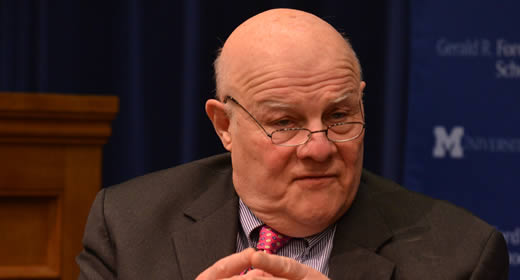
Is Brazil the New Dominant Power in South America?
Question from "Latin American Advisor"
With a booming economy and financing from its giant state development bank, Brazil has been implementing infrastructure and other projects across South America. However, the country is also beginning to face pushbacks from its neighbors, which worry that Brazil's interests may come at a high domestic cost. Bolivian President Evo Morales recently canceled a high-profile road that was financed by Brazil after major protests. Other projects in Guyana, Ecuador, Peru and elsewhere have also stalled, The New York Times reported. How do you see Brazil's influence in South America? Is it slowly replacing the United States as the new dominant power in the region, as some have suggested? Is Brazil promoting its own economic development at the expense of its neighbors?
Answer from Ambassador Melvyn Levitsky
"There is little doubt that Brazil has made tremendous progress in the past 20 years in both its domestic economy and in its foreign policy. During my period as U.S. ambassador, President Cardoso and his team turned the economy around and began to act more vigorously and responsibly in the world arena. Presidents Lula da Silva and Rousseff have taken the domestic economy a step further, evening up somewhat the gap between rich and poor, keeping inflation down and despite some misguided alliances with radical leaders in the hemisphere and beyond, burnished Brazil's reputation as a serious country to be reckoned with internationally. However, before we assign Brazil a dominant role in the hemisphere, consider its domestic politics. I do not believe that a country with the level of corruption that pervades Brazilian politics and society can serve as a model to be emulated and prized by other countries in South America or elsewhere. Witness the regular forced march of politicians out of the executive and legislative branches on grounds of corruption just in the past year. Brazil's leaders have tried for years to accomplish 'political reform,' particularly of the party system in which politicians jump from one party to another or form new parties in order to gain government favors and positions. Witness the continuing high—and perverse—'Brazil cost' of doing business in the country, which has limited foreign direct investment and promoted bribes and graft. Brazil is a great country with boundless natural and human resources. If it can bring reform to bear on its political system, the sky's the limit."
Editor's note: The above is a continuation of a Q&A published in the Nov. 30 issue of the Advisor.
Posted with permission by Inter-American Dialogue's Latin America Advisor.
[Read full edition]